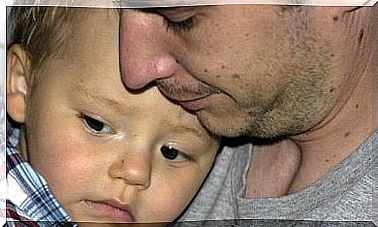Peaks In Breast Milk Production: When Do They Occur?

Peaks in breast milk production are of great benefit to infants. When do they occur and why?
In this article, we discuss, among other things, how certain hormones affect this process. You will also discover why you as a mother play a fundamental role in your child’s food intake and eating.
Prolactin: responsible for peaks in breast milk production
Prolactin is the hormone responsible for stimulating the mammary glands to produce breast milk. Consequently, the levels of this hormone gradually increase from the first trimester of pregnancy.
However, prolactin does not produce milk directly because the progesterone and estrogen levels produced by the placenta inhibit its effects.
When the placenta is expelled, prolactin initiates milk production, which is maintained at high levels for several months after delivery. In addition, these peaks in breast milk production are determined by the frequency with which the baby sucks. The more the baby sucks and drinks, the more milk is produced.
That is, if you breastfeed often, milk levels increase. On the other hand, if your baby only drinks a little milk, the amount of milk in your breasts will decrease. This can be clearly seen during growth phases when the baby seems to breastfeed much more, precisely to satisfy the increased need for nutrition that its growing body has.
When do peaks in breast milk production occur?
Prolactin levels multiply, between 10 and 20 times, each time the child eats. This means that peaks in breast milk production appear.
These peaks reach their maximum levels when the baby sucks on the breasts at night – from 20 to 40 minutes after the stimulus has started. This increase in milk can be about 3 to 4 hours.

In addition, the hours where you can stimulate these peaks in breast milk production are at most between 2 and 6 in the morning. For this reason, it is advisable to breastfeed during the night when your baby wants it.
How does oxytocin affect breast milk?
Oxytocin is a hormone that takes effect during childbirth and breastfeeding. It allows the milk to squirt out spontaneously as soon as the baby sucks.
Many mothers may feel the effects of this hormone because it causes a form of contraction and tingling in the breast. It feels like the milk is coming out and you can even see a few drops starting to leak out. This is known as the expulsion reflex.
A mother’s thoughts and imagination can stimulate oxytocin. Therefore, this hormone plays a key role in triggering milk production. In fact, this production can be activated by just wanting to breastfeed their baby or by listening to children crying.
Conversely, negative thoughts about breastfeeding can have an inhibitory effect. It can reduce the amount of milk, even to the point where the breasts become completely empty.
Why should you breastfeed your baby at night?
It is advisable to breastfeed in the evening and at night because breast milk production at that time is stimulated extra much. It also makes it possible for the baby to gain weight.
It has also been shown that when children are breastfed in the evening, they sleep more and better during the night. The reason is that prolactin also has a relaxing effect on the mother and baby.
Another reason to breastfeed at night is that it reduces the risk of infections for the mother. It also prevents blockages and congestion in the breast due to milk accumulation. It is a common problem when the baby goes for a long time without breastfeeding.
Are you going to increase the amount of breast milk?
In most cases, this is not necessary because every woman is naturally prepared to produce milk so that it is enough for her baby. As long as breast stimulation is done through breastfeeding, there will be enough milk.
However, there are some extreme circumstances that require the mother to help stimulate breastfeeding.
For example, if the baby has lost a lot of weight or was born prematurely, a rapid increase in milk production is required. Another factor is a forced separation of the mother and child due to a hospital stay.

In these cases, the doctor may prescribe certain drugs that stimulate milk production. An example of such a drug is Primperan.
Another solution is vigorous extraction of breast milk. This action consists of expelling milk for 5 minutes from each breast every hour.
To do this, a breast pump is used every hour throughout the day. At night, a 4-hour break is allowed to let the mother rest. This protocol also activates the secretion of prolactin, which results in a rapid increase and peaks in breast milk production.
In summary, peaks in breast milk production help you meet the need for milk that the baby has for a healthy and rapid growth. It is without a doubt an aspect that all new mothers must take part in and keep track of in their daily lives as new mothers.









